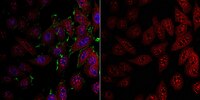ABN896 Sigma-AldrichAnti-LDHA
Anti-LDHA, Cat. No. ABN896, is a highly specific rabbit polyclonal antibody, that targets L-lactate dehydrogenase A chain and has been tested in Immunocytochemistry, Immunohistochemistry (Paraffin), and Western Blotting.
More>> Anti-LDHA, Cat. No. ABN896, is a highly specific rabbit polyclonal antibody, that targets L-lactate dehydrogenase A chain and has been tested in Immunocytochemistry, Immunohistochemistry (Paraffin), and Western Blotting. Less<<Recommended Products
Overview
| Replacement Information |
|---|
Key Spec Table
| Species Reactivity | Key Applications | Host | Format | Antibody Type |
|---|---|---|---|---|
| R, H | ICC, IF, IHC, WB | Rb | Affinity Purified | Polyclonal Antibody |
| References |
|---|
| Product Information | |
|---|---|
| Format | Affinity Purified |
| Presentation | Purified rabbit polyclonal antibody in buffer containing 0.1 M Tris-Glycine (pH 7.4), 150 mM NaCl with 0.05% sodium azide. |
| Quality Level | MQ100 |
| Physicochemical Information |
|---|
| Dimensions |
|---|
| Materials Information |
|---|
| Toxicological Information |
|---|
| Safety Information according to GHS |
|---|
| Safety Information |
|---|
| Storage and Shipping Information | |
|---|---|
| Storage Conditions | Stable for 1 year at 2-8°C from date of receipt. |
| Packaging Information | |
|---|---|
| Material Size | 100 μg |
| Transport Information |
|---|
| Supplemental Information |
|---|
| Specifications |
|---|
| Global Trade Item Number | |
|---|---|
| Catalogue Number | GTIN |
| ABN896 | 04054839069604 |
Documentation
Anti-LDHA SDS
| Title |
|---|
Anti-LDHA Certificates of Analysis
| Title | Lot Number |
|---|---|
| Anti-LDHA - 3509156 | 3509156 |
| Anti-LDHA - 3911628 | 3911628 |
| Anti-LDHA -Q2753913 | Q2753913 |










